If you are here, you are probably going to have IELTS exam in the nearest future, right?
We are ready to help you with the toughest part of this process – IELTS preparation at home.
Closer to the point, we’ve created a thorough guide on how to prepare for IELTS at home. This are the aspects you will find in our article below: the general advice on the preparation process, explanations and tips for each section, advice on how to work with the IELTS answer sheet.
Let’s go!
🧱 IELTS Preparation at Home. The Basics
By now, you have made the first step – you chose IELTS as the exam of your dreams. Well, maybe more like nightmares, but it doesn’t have to be this way! With the help of our guide, you won’t have to worry too much.
Rule number one when dealing with English language exams is to check the format and rules. This article is not a typical one because it will teach you how to prepare for IELTS at home!
The Best Advice on IELTS Preparation and Practice
Everyone tells you that the best way is to take preparation classes. It is a good idea indeed. However, it can hit your pocket really hard…
The good news is that you can prepare for IELTS at home.
Here’s how:
1. IELTS Time Management
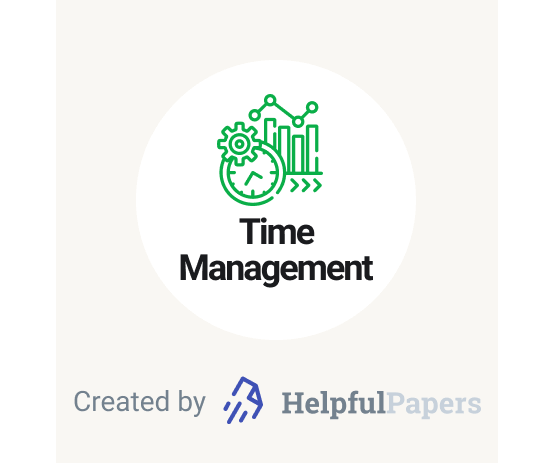
One of the vital aspects is time management.
Set the exam conditions while you practice IELTS ➔ it will let you understand how much time you need for various tasks ➔ you distribute the available time most efficiently.
Sometimes, it goes as far as doing simple math. For example, if there are forty test questions and you only have one hour, you can’t stop at each question for longer than one minute! Otherwise, you risk leaving it unfinished. Don’t worry. Everything gets easier with more practice!
2. Regularity of IELTS Preparation at Home
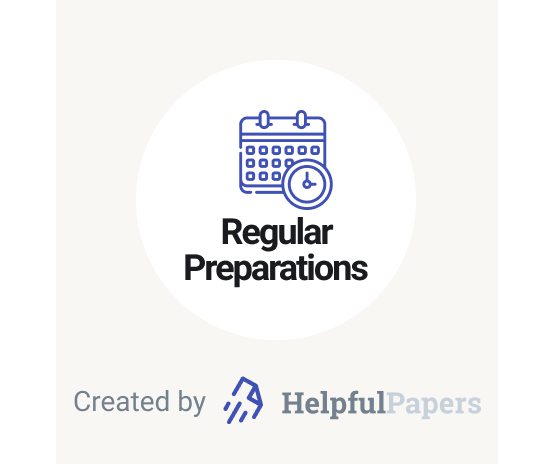
This rule works for all kinds of skills, not only language learning. When you take a break from practicing, you feel that it doesn’t go as smoothly as it used to be the next time you pick it up.
Your task is to make IELTS preparation a part of your daily routine. Depending on how much time you have left till the test, you may practice for half an hour or longer.
N.B.: studying for an hour every day would give better results than two hours every other day. However, try to stick to your schedule at all times!
3. All-Inclusive IELTS Preparation at Home
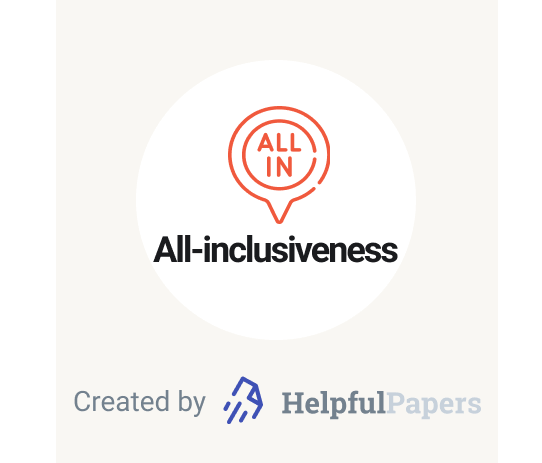
If you decided to prepare for the IELTS exam by yourself, you need to adopt the most effective strategy. Include all aspects in your IETLS at-home preparation.
As you probably already know, the test consists of 4 parts checking different skills. Some of the components may seem challenging for you, and it’s crucial to pay attention to those skills first. However, even if you feel confident with other tasks, it doesn’t mean you can skip practicing them! It’s one of the biggest mistakes of first-time testers and those who prepare for the exam at home.
🎧 How to Prepare for IELTS at Home: Listening
This section discusses particular aspects that you need to pay attention to while preparing for the listening. Students note that this part of the exam feels the most challenging. Therefore, dig into the following IELTS listening tips!
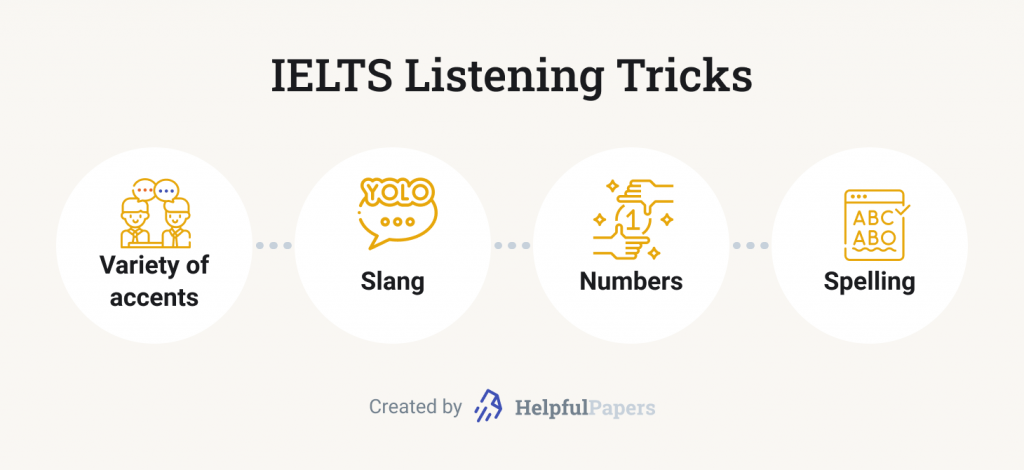
- Variety of accents. Since IELTS is an international test aiming to test you closest to the natural environment, there will be multiple English accents. Most likely, you will hear British or Australian. However, be prepared to understand non-native speakers as well.
- Slang. Another confusing thing is the use of slang. Speakers don’t usually use English academic daily, so there is a high chance you will have to deal with collocations and informal language such as idioms and slang.
- Numbers. Some students find it difficult to understand numbers while listening. However, there is nothing that regular practice can’t fix! Just remember to check the rules of spelling.
- Spelling. We can’t stress the importance of spelling enough! Even if you get the word correctly, wrong spelling won’t give a score! Before filling in the answer sheet, concentrate on spellcheck.
IELTS Listening Format
As you already know, finding out everything about the test format is crucial. Here, we describe each part of IELTS listening and explain their significance for your overall scoring. For each piece, you will need to hear an audio first and then complete a task. Usually, it is either a monologue or a conversation between two and more people.
IELTS Listening Strategies
There is a way to deal with any type of listening task 😊
Do you want to know?
We repeat it only once:
Step 1️⃣ Analyze. Use the time for preparation wisely. You have about 30 secs to study the questions before the recording starts playing. Make sure you check this for each question: type of question and answer, keywords.
Step 2️⃣ Make predictions. Based on what you learned from the previous step, you can guess the answer. Knowing the general topic of the audio and the answer part of the speech will help you.
Step 3️⃣ Track. All questions go in the order corresponding to the audio. Therefore, by listening carefully, you can easily see what problem is discussed at that moment.
IELTS Listening Answer Sheet
We need to discuss one more formality. Trust us; it is as important as improving the language itself. Knowing all ins and outs of the IELTS listening answer sheet beforehand will save you a lot of time during the exam!
The good news is that you will know how to deal with the answer sheet after reading our tips below.
- One more good news: you are given 10 extra minutes to transfer answers to the answer sheet.
- You only hear the recording once, so you need to multitask here: listen to the recording, read the questions, and answer them simultaneously.
- Practice working with the answer sheet while preparing for IELTS at home. It will ease your exam experience a lot.
- The more trained you are, the more wisely you can use those 10 minutes.
- Check every single word for spelling. Inattentiveness and rush happen every other time. So, play it safe.
Here you can find an example of the IELTS listening answer sheet.
📖 How to Prepare for IELTS at Home: Reading
You can easily prepare for IELTS reading at home if you know what to focus on. This section is what you need!
There are a few aspects that every student absolutely should work on, apart from practicing mock tests.
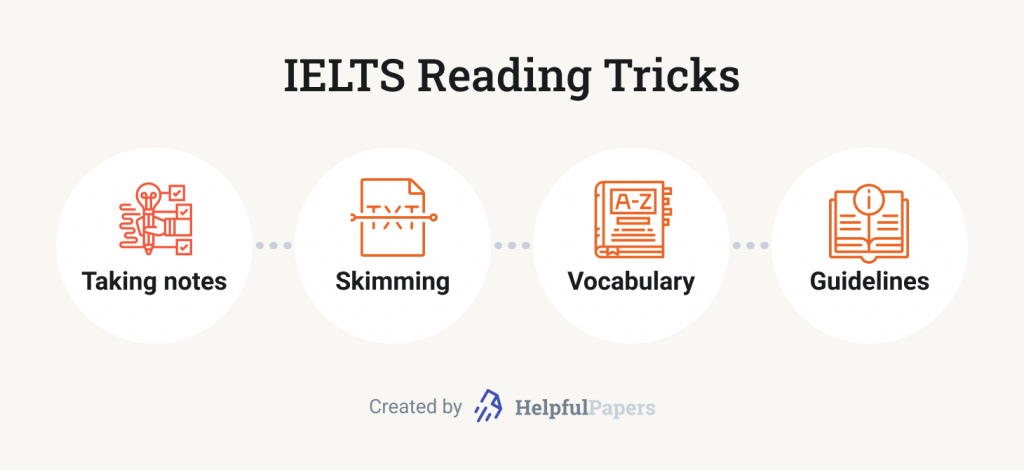
- Take notes. While looking through the text, it’s recommended to take notes of the main points.
- Skimming. It is paired with note-taking. We discuss the strategy below.
- Vocabulary. Don’t spend too much learning new vocabulary. The reading part aims to test your ability to understand written English. Even if you forget the translation of a specific word, you should be able to guess its meaning from context.
- Guidelines. Always check the guidelines! You need to pay attention to the directions, or you may lose some points unintentionally.
IELTS Reading Time & Format
One problem that everyone faces is the lack of time. It happens mainly because of ineffective time management. You only have 60 minutes to read all the texts and answer 40 questions.
It may sound intimidating for the first-timers, but a bunch of helpful tips below should help:
IELTS Reading Strategies
There are several strategies that you might find helpful for the reading part. You don’t have to adopt all of them. Just try and pick one that you feel is the most effective for you.
Maybe it will even inspire you to come up with your solution!
Strategy 1️⃣ Skimming. It is a basic technique that is widely used in academic English classes. Such a strategy aims to look through the text fairly quickly and to highlight the words that seem important. Note that you shouldn’t read it deeply. Just spend a few minutes skimming. Typically, students do it before studying the questions, so they try to guess what information they might need.
Strategy 2️⃣ Take notes. As you go through the text quickly, underline the clues you think might help you (names, dates, etc.). At the same time, write down a couple of words about the main idea of each paragraph. Altogether, it makes up a pretty decent summary of the text. Such a strategy may be advantageous since many questions in the reading part relate to the main idea of specific passages.
Strategy 3️⃣ Scanning. This technique is different from skimming. Here, you need to have a specific target in mind. So, if you prefer to go through the questions first, it is perfect for you! All you need to do is find keywords and use them as guides while reading the text. Again, no need to read every word. You should only look for the information related to the keywords that you identified earlier.
IELTS Reading Answer Sheet
One of the most crucial aspects of preparing for IELTS is getting to know the answer sheet. This paper will be used to score your test. If there is any mistake on it, you lose points.
Follow us:
- You have one hour for everything. It means there is no extra time for copying your answers in the answer sheet.
- You may take notes on the question paper. However, you have to hand it back to the supervisor at the end. Only those answers count that are on the answer sheet.
- Use a pencil while transferring everything to your answer sheet (it allows the scanner to work more effectively). Use this chance and bring an eraser to correct any mistake.
- Make sure you put the answer in the correct box, or you may lose points.
- You can use capital letters. It makes your handwriting easier to read. Moreover, this tip may save you if you forget to capitalize names.
Get familiar with the IELTS reading answer sheet here.
🖊️ How to Prepare for IELTS Writing
You may be surprised, but there is nothing too complicated in achieving your desirable band in IELTS writing.
A widespread mistake many students make: they try to write something overly pompous, thinking that it will impress the examination committee. However, simplicity is better.
You only need to follow the requirements and write a complete response. A fantastic bonus would be the coherence of your writing and perfect grammar. You should use academic English, of course, but try not to overdo it with fancy words. Make sure your advanced vocabulary fits the overall style of writing.
IELTS Writing Task 1 Band 9
Even though there are some differences between the IELTS exam’s general and academic writing parts, the requirements are pretty much the same. You will have 20 minutes to write about 150 words.
This is how they score your writing:
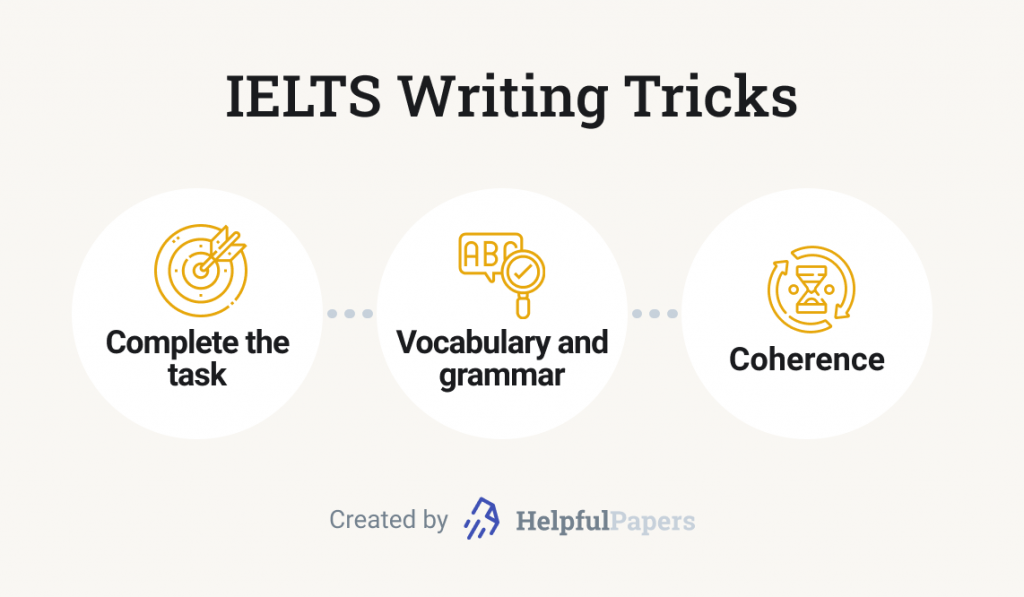
- Task completion. If you want to get band 9, which is the highest score for this exam, you should meet every single requirement in the writing task. Omitting something may lead to the loss of points!
- Vocabulary and grammar. Inappropriate use of terminology decreases your score. Your grammar also needs to be on a perfect level. Using simple grammatical structures may help you avoid mistakes, but it won’t get you the score as high as complex structures will.
- Coherence. Not only should your writing be understandable and meaningful, but it also needs to be easy to read. The transition between the thoughts has to be smooth and natural.
General IELTS Writing Task 1
The first task of writing in IELTS General is a situation you need to address. It may be either a formal or informal letter, around 150 words. You receive guidelines on what to write about. Most likely, there’re three points you have to include in the response. So, write at least three paragraphs in your letter.
Let’s go through the key aspects that will help you get the best score:
IELTS Writing Task 1 Academic
The rules for IELTS academic writing task are the same. You will have about 20 minutes to write a short open answer for at least 150 words long. Scoring criteria are the same for both types of IELTS writing tasks. Here, your question paper will have at least one picture.
Most likely, there will be one or two charts or maps. Along with those, you get instructions. Usually, you would be asked to write a report based on what you see on the visuals. There are some specifics about this task that you should know:
IELTS Writing Task 2 Band 9
The second part of the writing part takes longer to complete.
This task gives you two-thirds of the total score, while the previous one scores only 1/3. There is also a difference in the word count minimum – Task 2 requires you to write at least 250 words.
Moreover, it needs to be a more complex answer which is basically a full five-paragraph essay. Therefore, you should spend about 40 minutes on this one.
Here are some aspects to keep in mind:
🗣️ How to Prepare for IELTS Speaking
Speaking might feel like the most nerve-wracking part of the whole exam. However, there is a fantastic remedy that guarantees your success.
You need to get used to speaking English! Therefore, the best strategy to adopt while preparing for IELTS speaking task at home is everyday practice.
Don’t forget about the specifics of this exam:
How to Practice IELTS Speaking at Home
We promise, it’s the last part. Read this one and you can have some rest – it was a very informative material.
Okay. How do we practice IELTS speaking at home?
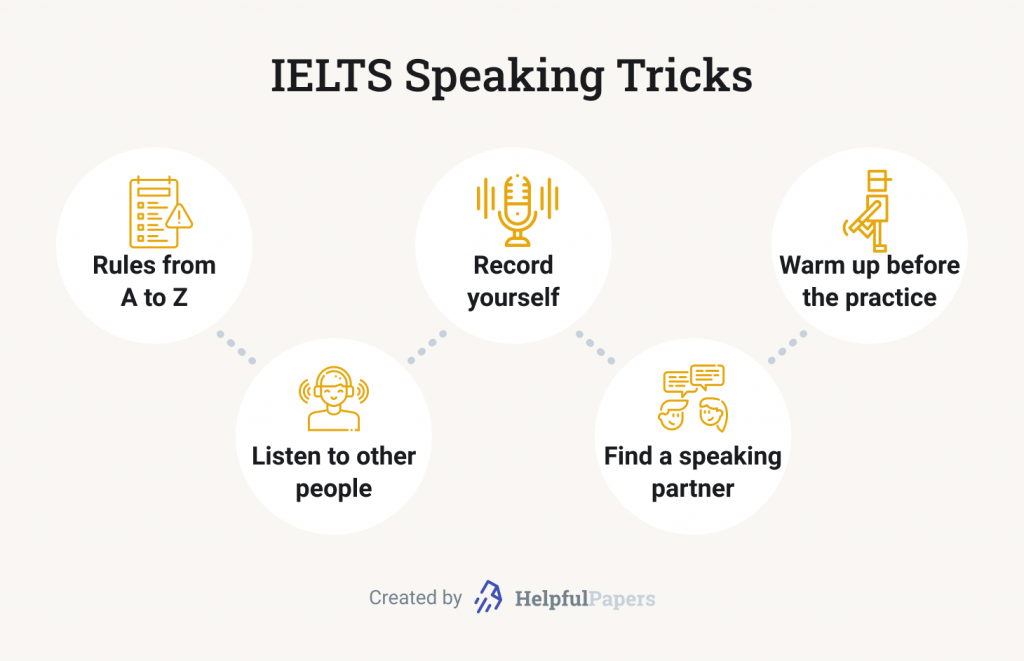
- Of course, we start with learning all the rules from A to Z. This band descriptors will help you to figure what do examinators expect from you, as well as clarify the crucial requirements.
- Listen to other people’s answers. Use YouTube, official IELTS prep materials, or any other sources (make sure they are reliable!) where you can look at high-quality examples.
- Record what you say. Else, how will you know what are your weak points? Listening to yourself from the side is vital. Try to be as objective as possible.
- Get a speaking partner. Live communication is one of the best remedies to improve your speaking skills. The best option would be if it is someone who has practiced IELTS speaking before.
- Do a full-day warm up. Just like a physical activity, speaking requires a good preparation of muscles, speech muscles. In other words, talk, talk, and talk – make yourself comfortable with the language.
Another important thing to consider (and it refers to all sections): don’t try to solve all problems at once! First, go through the first task, then practice another one, or vice versa.
Just like that, step by step, you will get there.
And here we wrap our how-to-prepare-for-IELTS-at-home guide!
Do you still have questions? Let us know below in the comments section.
We wish you lots of patience, strength, and smart words 😉
Good luck 🍀